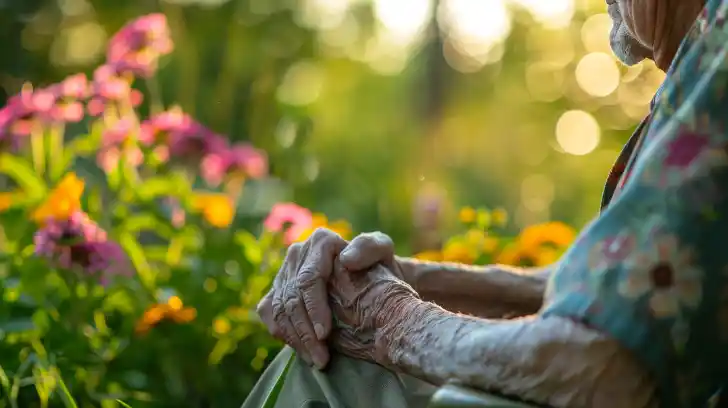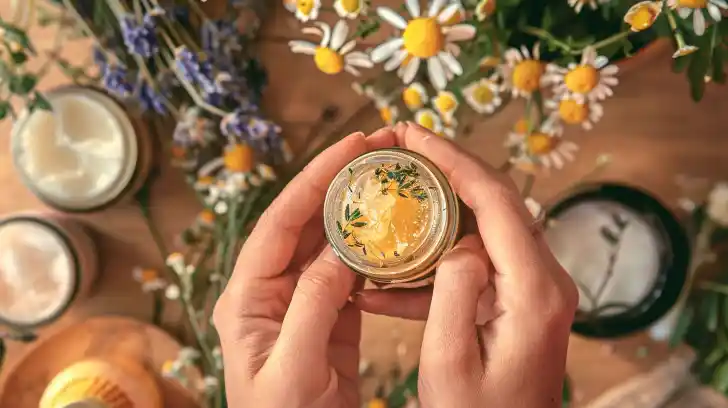Facing severe plaque psoriasis is a big challenge for many seniors. This skin condition affects millions, making skin cells pile up rapidly on the surface of the skin. Our blog will guide you through non-medicated ways to manage this condition, focusing on lifestyle and natural approaches.
Key Takeaways
- Seniors are managing severe plaque psoriasis by reducing stress through meditation, yoga, and social activities.
- Changing diets to include more anti – inflammatory foods like flax seeds and less red meat helps control symptoms without medication.
- Physical activities such as walking and gardening aid in maintaining a healthy weight, essential for keeping psoriasis under control.
- Avoiding skin injuries, infections, tobacco use, and excessive alcohol consumption can prevent flare – ups of the condition.
- Emotional well – being is crucial; support from friends, family, or therapists combats the stress that might worsen psoriasis.
Understanding Plaque Psoriasis in Seniors

Plaque psoriasis isn’t just a skin issue; it’s an immune system battle showing up on the skin, especially in older adults. Causes range from genetic factors to lifestyle choices, leading to red, scaly patches that can itch or hurt.
Causes
Your body’s first line of defense, known as the immune system, often shields you from diseases and infections. Yet, with plaque psoriasis, it does something unusual—it turns against your skin cells.
This autoimmune reaction causes the body to create new skin layers much faster than usual. This results in those thick, uncomfortable patches on your skin. Think of it like a garden where plants grow too quickly and crowd each other out.
Genetics also play a big part in this condition. If someone in your family has plaque psoriasis, your chances of having it are higher. But that’s not all—factors such as stress, certain injuries to the skin, some infections or medications can trigger it too.
Even changes in weather along with tobacco or alcohol use have been linked to outbreaks. It’s like adding fuel to a fire; these factors can spark off flare-ups for people already likely to develop this chronic inflammatory skin disease.
Symptoms
Plaque psoriasis makes skin cells grow too fast. This leads to thick, scaly patches called plaques on the body. These patches can be silver or red and might feel itchy or sore. For some seniors, psoriasis also affects their nails and joints, causing them to have discolored, rough nails and joint pain known as psoriatic arthritis.
Different people see different signs of this condition. Besides plaques and nail changes, they might notice swelling in areas like hands and feet if it turns into arthritis. Since there are many types of this skin issue, symptoms vary widely but often include dry, cracked skin that may bleed or itch severely.
Traditional Treatments for Psoriasis

Doctors often suggest creams and pills to treat psoriasis. These options can really help manage the symptoms.
Topical treatments
Topical treatments use creams and ointments applied directly onto the skin. These include steroids and vitamin D3 analogs, often prescribed for psoriasis in seniors. Steroid creams help reduce inflammation and slow down skin cell growth, which can ease symptoms quickly.
Vitamin D3 analogues work by changing how skin cells grow, leading to less scaling and smoother skin.
Doctors also prescribe calcipotriol, a kind of medication that combines with other treatments for better results. This is common before and after elderly patients move into nursing homes.
Using these ointments as directed can lead to significant improvements in itchy and flaky skin conditions without having to rely on more potent drugs or systemic therapies.
Systemic medications
Systemic treatments often play a supporting role for seniors dealing with psoriasis. Drugs like methotrexate and cyclosporine can help control symptoms by targeting the entire body.
These medications work from the inside, aiming to reset the immune system‘s attack on skin cells. Yet, they’re not always the front line of defense due to side effects and health concerns in older adults.
Biologics, another class of systemic treatment, specifically target parts of the immune system to reduce inflammation and slow down skin cell production. Unlike general immunosuppressants that affect the whole immune system, biologics focus on particular pathways.
This precision can lead to fewer overall side effects but requires careful monitoring by a healthcare provider skilled in managing autoimmune conditions like rheumatoid arthritis or Crohn’s disease alongside psoriasis.
The Problem with Medications and Steroids for Seniors
Medications and steroids often cause issues for seniors dealing with plaque psoriasis. These treatments can lead to allergic reactions or side effects that are hard on the elderly.
Topical ointments, a common remedy, may also pose challenges. Some seniors find it tough to apply these creams without help due to mobility problems or arthritis.
Using systemic therapies like biologics is rare in senior care for psoriasis. Only about 2% of seniors receive prescriptions for these drugs due to risks and complications. Steroids might be given for different health troubles, not just psoriasis, making it tricky to track how severe someone’s condition is based on their medicine alone.
This complexity means finding the right treatment requires careful thought and often seeks safer alternatives.
Non-Medicated Approaches to Managing Psoriasis
Shifting away from pills and creams opens up a whole new world for tackling psoriasis. Seniors are finding success by turning to lifestyle tweaks and stress relief strategies, learning that managing this skin condition goes beyond traditional medicine.
Stress management
Stress plays a big role in managing severe plaque psoriasis for seniors. Many find relief through methods that reduce stress without turning to medications.
Here’s how seniors can tackle stress effectively:
- Meditation – This practice helps calm the mind and body. Seniors can start with just a few minutes a day and increase as they feel comfortable. It’s all about finding a quiet place, focusing on breathing, and letting go of stressful thoughts.
- Yoga – Combining physical postures, breathing exercises, and meditation, yoga is an excellent way for seniors to ease stress. Gentle yoga classes are great for beginners and those with mobility issues.
- Light Physical Activities – Walking or gardening are not just physical activities but also ways to get fresh air and sunshine. These simple activities can significantly lower stress levels.
- Hobbies – Engaging in hobbies or interests such as painting, knitting, or playing music gives the mind something positive to focus on, pushing away stressful thoughts.
- Socializing – Spending time with friends or family members who uplift you can dramatically improve your mood and reduce stress.
- Healthy Eating – Foods rich in omega-3 fatty acids like flax seeds and soybeans have been shown to help reduce inflammation associated with stress.
- Limiting Alcohol Intake – While it might seem like having a drink relaxes you, alcohol can actually increase stress levels over time.
- Getting Enough Sleep – A good night’s sleep supports overall health and helps manage stress better during the day.
- Time Management – Planning your days can prevent rushing and feeling overwhelmed, which reduces unnecessary stress.
- Seeking Professional Help if Needed – Sometimes talking to a psychologist or joining support groups where you share experiences with others facing similar challenges can provide comfort and strategies for coping with psoriasis-related stress.
Managing stress is key in controlling flare-ups of severe plaque psoriasis for seniors without relying solely on medication solutions.
Diet modifications
Seniors are finding success in managing psoriasis through diet changes. This approach lets them tackle the condition without heavy reliance on medicines or creams.
Here are key steps to altering your diet for better psoriasis management:
- Cut back on trigger foods. Foods that cause inflammation, like red meat and dairy products, can worsen psoriasis symptoms. Try to eat less of these and note if your skin improves.
- Increase anti-inflammatory foods. Items rich in omega-3 fatty acids, such as fish, flax seeds, and walnuts, help reduce inflammation in the body. Adding these to your meals can support skin health.
- Choose whole grains over refined ones. Whole grains contain more nutrients and fiber than their refined counterparts, aiding digestion and overall health.
- Limit alcohol consumption. Drinking can trigger psoriasis flare-ups, so cutting down might help keep your skin clear.
- Stay hydrated with water instead of sugary drinks or alcohol — proper hydration is crucial for maintaining healthy skin.
- Opt for plant – based meals when you can. Meals centered around veggies, fruits, beans, and nuts are less likely to provoke psoriasis symptoms compared to diets high in processed foods and animal products.
- Consult a dermatologist or nutritionist familiar with psoriasis for personalized guidance tailored specifically to your needs.
Each person’s experience with psoriasis is unique; thus, keeping a food diary can be helpful for identifying personal triggers and pinpointing which dietary changes make the most difference for you.
Avoiding triggers
Living with severe plaque psoriasis can be tough, especially for seniors. But, you have the power to fight it without always turning to medications and steroids. Here’s how:
- Keep stress low – Stress is a big trigger for many people with psoriasis. Look for ways to relax and stay calm. Maybe try meditation, gentle exercises like walking or tai chi, or hobbies that you love.
- Protect your skin – Minor injuries to your skin can cause a psoriasis flare – up. Wear gloves when gardening, use mild soaps that won’t irritate your skin, and moisturize regularly to keep your skin barrier strong.
- Stay away from infections – Getting sick can make your psoriasis worse. Wash your hands often, avoid close contact with people who are ill, and consider getting vaccinations recommended by your doctor.
- Watch the weather – Both cold, dry weather and hot weather can affect psoriasis. Use a humidifier in winter to keep air moist indoors and seek shade or use air conditioning during hot spells.
- Say no to tobacco and limit alcohol – Smoking and heavy drinking can trigger psoriasis or make it harder to treat. Quitting smoking is tough but worth it for your skin and overall health; likewise with cutting back on alcohol.
- Review your meds – Some medications might worsen psoriasis symptoms. Always talk with your doctor about the drugs you’re taking to see if they could be affecting your condition.
- Manage what you eat – Certain foods might trigger psoriasis in some people. Though it varies from person to person, generally eating plenty of fruits, vegetables, lean proteins, and whole grains while limiting sugary snacks and fatty meats may help.
Each body reacts differently — what triggers one person’s psoriasis might not affect another’s at all. Paying attention to how these factors relate to your own symptoms can help you control flare-ups more effectively without heavily relying on medication or steroids.
The Role of Lifestyle Changes in Psoriasis Management
Making lifestyle changes plays a big part in handling psoriasis better. Eating right, staying active, and keeping stress low can help your skin feel better. Check out more tips to keep psoriasis under control.
Maintaining healthy body weight
Keeping a healthy body weight is key for seniors tackling severe plaque psoriasis without medicines and steroids. Carrying extra pounds can make skin conditions worse, leading to more problems with psoriasis.
Simple daily activities—like walking or gardening—help manage weight and reduce psoriasis flares. Eating foods that are good for the heart also plays a big role. These foods include fruits, vegetables, whole grains, and lean proteins.
Actions like cutting back on sugar-heavy snacks and fatty treats help in keeping the scales at bay. Drinking plenty of water throughout the day keeps you full and stops you from overeating.
Also, making small changes in your diet can lead to big health benefits over time, not just in managing psoriasis but also in preventing other health issues related to being overweight or obese.
Eating a heart-healthy diet
Eating right plays a big role in managing psoriasis for seniors. A heart-healthy diet means filling your plate with fruits, veggies, whole grains, lean meats like poultry and fish, and good fats found in nuts and olive oil.
These foods are not just tasty; they’re packed with nutrients that can help keep your skin and body feeling great. Cutting back on processed snacks, sweet treats, and fatty foods is also key to keeping psoriasis symptoms in check.
Making these diet changes can have a positive effect on your overall health too. It’s about choosing foods that support your immune system without causing extra inflammation or weight gain.
Staying hydrated with plenty of water rather than sugar-packed drinks makes a difference as well. Every bite counts towards not only fighting psoriasis flares but also boosting heart health to keep you active and enjoying life.
Limiting alcohol consumption
Cutting down on alcohol helps in managing severe plaque psoriasis. Alcohol can make symptoms worse and may cause more inflammation, leading to flare-ups. Seniors who drink less alcohol might see an improvement in their condition without relying solely on drugs and steroids.
Making small changes, like drinking less, can have a big impact on your health. It’s part of living a healthier lifestyle that includes eating right and staying active. This approach supports your body’s fight against psoriasis flares and keeps your overall well-being in check.
Regular physical activity
The importance of staying active can’t be overstated for seniors dealing with psoriasis. Moving your body helps in more ways than one. It keeps your weight in check, which is crucial because extra pounds can make psoriasis symptoms worse.
Exercise also reduces stress, a known trigger for flare-ups. Whether it’s a brisk walk, gardening, or low-impact aerobics, finding an activity you enjoy means you’re more likely to stick with it.
Making exercise a part of your daily routine could mean fewer doctor visits and less need for strong medicines or steroids. Studies show that people with psoriasis who are physically active tend to have milder symptoms.
This doesn’t mean you have to run marathons; even gentle yoga counts as physical activity and has benefits too numerous to count – from improving flexibility to boosting mental health!
The Importance of Emotional Health in Managing Psoriasis
Managing your feelings plays a big part in dealing with psoriasis. Stress can make skin problems worse, and having psoriasis can lead to feeling down or anxious. It’s key to find ways to relax and keep stress at bay.
Talking helps – whether it’s with friends, family, or professionals like therapists. They listen and offer advice on handling tough emotions that come with this skin condition.
Taking care of your mind is as important as looking after your body for those living with psoriasis. Activities like meditation, yoga, and deep breathing exercises are great for calming the mind.
Support groups offer a chance to meet others facing similar challenges; sharing experiences can provide comfort and new strategies for managing not just physical symptoms but emotional hurdles too.
These tools empower you to face psoriasis with resilience and hope.
Conclusion
Seniors are finding new ways to tackle severe plaque psoriasis without relying on medicines and steroids. They’re turning to stress relief techniques, changing their diets, and avoiding things that make psoriasis worse.
Regular exercise and keeping a healthy weight also play big roles. Plus, paying attention to emotional health helps them deal with this skin condition better. These steps show it’s possible to manage tough skin issues in more natural ways, offering hope for those looking to reduce reliance on traditional treatments.
FAQs
1. What is plaque psoriasis, and why do seniors face it often?
Plaque psoriasis is a stubborn skin condition that appears as patches of thick, red skin covered with silvery scales. It’s not contagious but can be itchy and painful. Seniors might see more of this because, well, their immune systems are getting a bit tired, making them prone to such autoimmune diseases.
2. Can light therapy really help with severe plaque psoriasis?
Absolutely! Light therapy—or phototherapy—uses ultraviolet light to slow down the growth of affected skin cells. This method shines bright for those who wish to avoid heavy medications or steroids, offering a ray of hope by easing symptoms without pills or injections.
3. Are there any natural treatments seniors can try at home?
Yes! Some seniors find relief through simpler means like moisturizing gels rich in salicylic acid or using omega-3 supplements to reduce inflammation. Remember though, what works for one might not work for another—it’s all about finding your groove.
4. How does diet impact plaque psoriasis in the elderly?
Diet plays a surprisingly big role! Foods high in anti-inflammatory properties—think fatty fish rich in omega-3s—can help calm the fire under your skin caused by psoriasis. On the flip side, certain items like alcohol and processed foods might fan the flames.
5. Is depression linked to severe plaque psoriasis among seniors?
Indeed, it is—a rather cruel double act where one often leads to the other… Psoriatic skin can cause significant emotional distress leading to depression; conversely stress from depression may trigger flare-ups too.
6. What should someone do if they suspect they have inverse or pustular psoriasis instead of plaque?
First off—don’t panic! Each type has its quirks and requires slightly different approaches… If you notice unusual lesions or if typical treatments don’t seem effective; consult a healthcare professional pronto—they’ll guide you on whether things like biopsies are needed to get you back on track.





